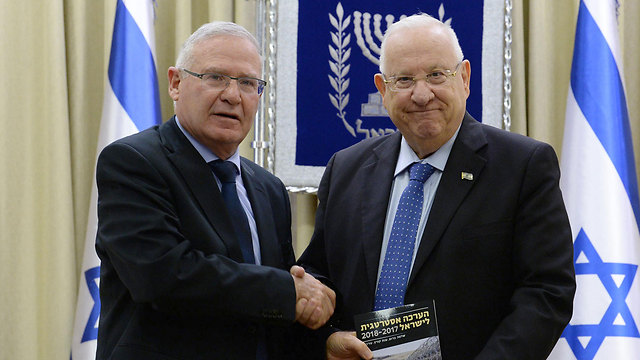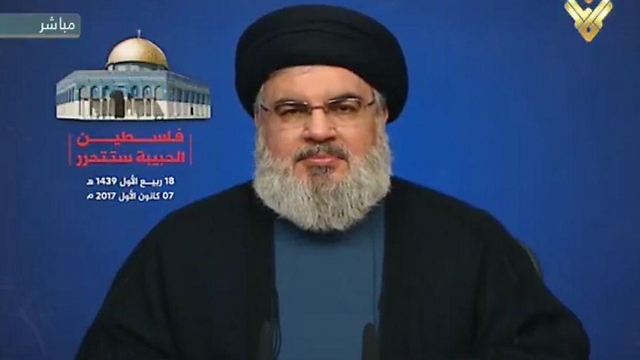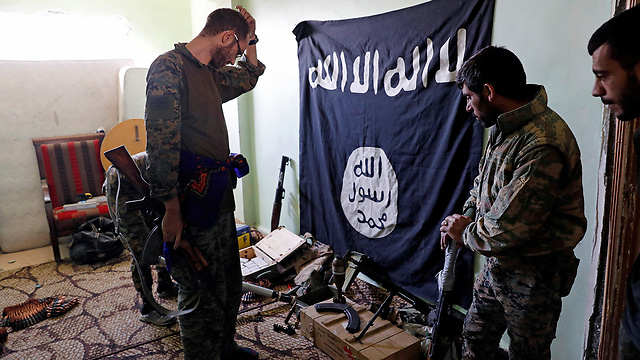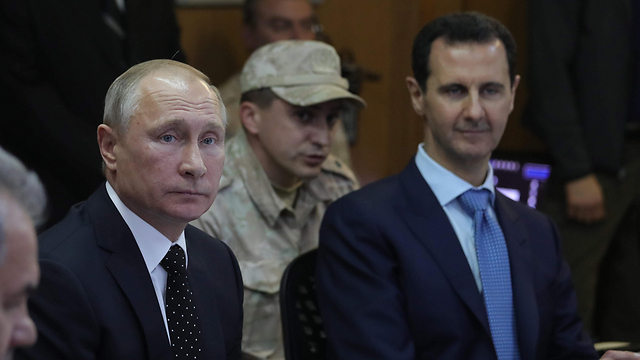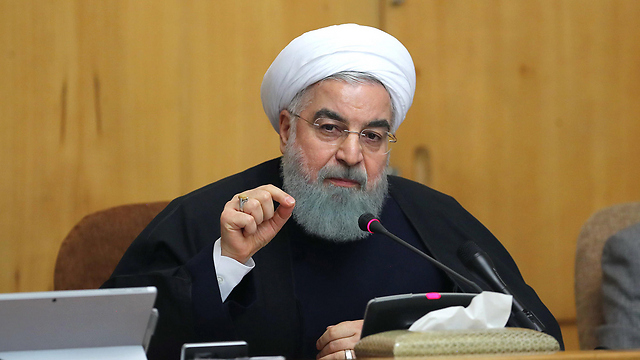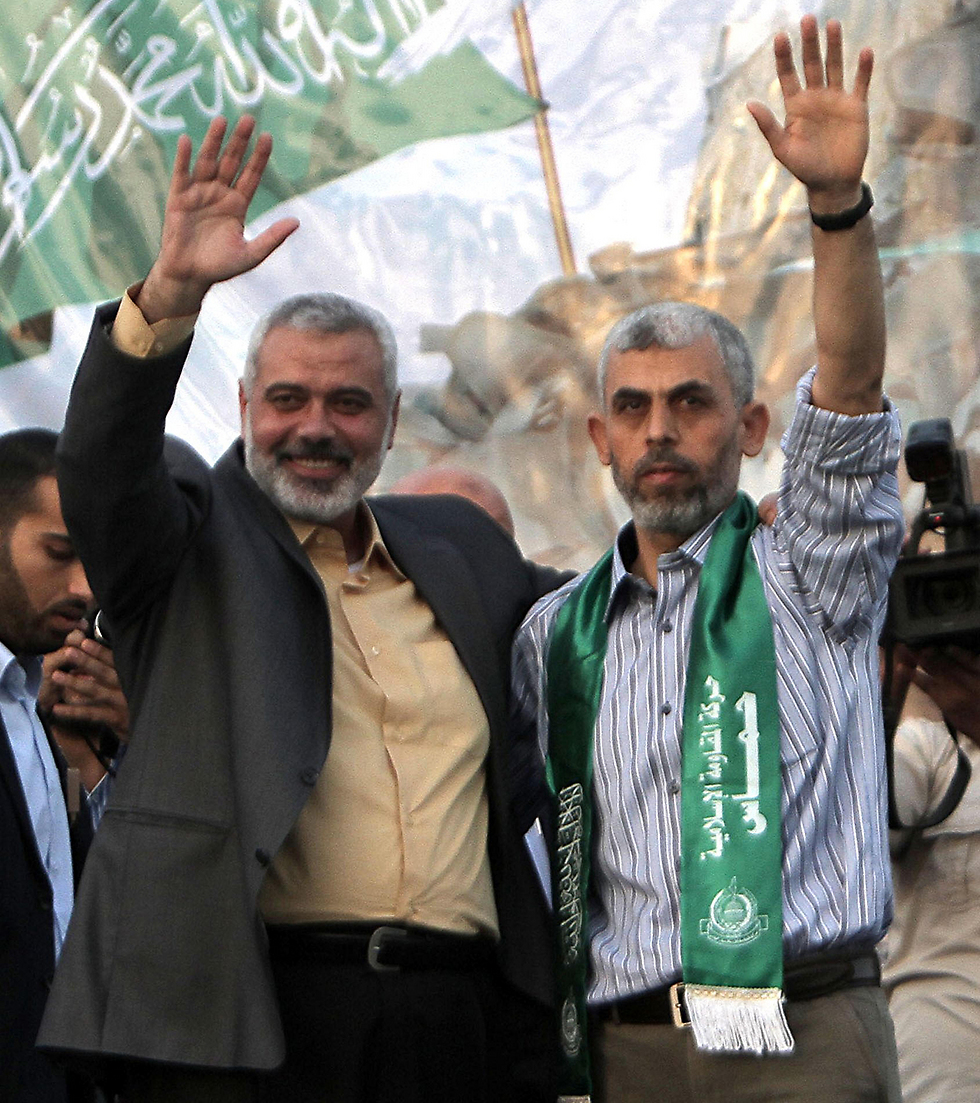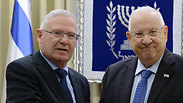
INSS report details threat of two-pronged 'First Northern War'
Report details Israel's strategic challenges for the coming year: war in north could break out against Syria, Lebanon at once, Islamic State's proximity to the border endangers northern communities, Iran continues efforts for regional supremacy and risk of escalation with Hamas persists.
"The entrenchment of Iran and its proxies in Syria and the expectation it will try gaining a foothold in the Golan Heights, raise the likelihood of escalation to war, in light of the Israeli government's red lines regarding Iranian presence in southern Syria," the evaluation said.
"The IDF is therefore required to improve its readiness for escalation and even war in the northern theater against Syria and Lebanon. Conflict—whether limited or total—between Israel and Hezbollah with Iranian backing constitutes the security challenge to which Israel must gird itself," the institute's evaluation further said.
The northern front – the First Northern War?
Neither Israel nor Hezbollah are interested in another war, Yadlin said. However, Israeli activities aimed at crippling Iran's entrenchment in Syria, alongside Hezbollah freeing itself of the task to save Bashar al-Assad's regime in Syria, may deteriorate the situation towards the "First Northern War," which will not necessarily be limited to Lebanon.
This potential war may safely be assumed to expand to conflict with Iranian forces and their vassals in Syria—perhaps even conflict with the Syrian army itself—possibly concurrently to a war against Hamas in the south.
The above factors will turn into conflict in the country's northern frontier into a war the breadth of which Israel has not experienced since the Yom Kippur War of 1973. The INSS said Israel must therefore prioritize any strategic and operative matters relating to waging war against three hostile entities in the north: Syria, Hezbollah and Iran. In the backdrop, Russia's military presence and involvement, while seemingly neutral, will more than likely impose limitations on Israeli freedom of action.
Israel must thus make ready for three alternative scenarios for war in the north: a war limited to Lebanon, a combined war with Syria and Lebanon—including Iranian and Shiite elements operating in Lebanon—and an all-out war that involves Iranian forces as well.
Moreover, wrongly interpreting the other party's intentions—either by Israel or Hezbollah—may lead to widespread escalation. A war against Hezbollah will lead to a heavy toll deep into Israeli territory; thousands of missiles and rockets will be launched at the north and deeper in-state, with simultaneous infiltration attempts into Israel by terror and guerilla squads for the purpose of harming border communities and essential infrastructures.
Under current conditions, the INSS stipulated, Lebanon and Syria must be treated as a single theater, as escalation on one front will invariably lead to escalation on the other, with some launches expected to come from Syria while Shiite militias and Syrian army forces likely attacking through the Golan Heights.
As that conflict is waged, Iran will be encouraging Hamas and the Palestinian Islamic Jihad to lob rocket from Gaza at Israel and carry out terrorist attacks by breaching the border fence and by using cross-border tunnels, in addition to also encouraging West Bank terrorists to carry out terror attacks.
The incendiary potential of conflict with Hamas persists
While Hamas is under effective deterrence, the INSS said it was continuing to gather its strength and that a conflict may break out—even if neither side wants it—over uncontrollable escalation stemming from a local incident, an initiative by jihad elements, difficulties in implementing the Palestinian reconciliation agreement causing to lash out at Israel or tensions surrounding the Jerusalem issue.
Regardless of the specific trigger, it must not be forgotten that socioeconomic hardship and humanitarian difficulties in Gaza will surly persist, further enflaming the mood.
Somewhat ironically, the IDF's solution to Hamas's offensive tunnels—currently being developed and deployed on the border—may push the organization to an earlier conflict to head off harm to this important facet of its strategic deployment.
IS near the border
While the Islamic State (IS) may have been defeated and lost its main strongholds in Syria and Iraq, it was this defeat that caused it to move its base of operations to regions that have not yet seen a concerted military effort to combat it.
IS presence in southern Syria near the Golan Heights, then, and especially in Sinai (in addition to the southern Syrian Golan Heights) has already been translated to numerous attacks against the Egyptian army and civilian populations. The radical organization's presence also points to a growing potential threat to Israel, with a large terrorist attack possibly planned.
Challenges and opportunities
Israel is strong, stable and its borders are calm. It maintained its military supremacy in the Middle East throughout 2017, as well as its deterrence against its enemies on the border—state and non-states alike—including Hezbollah, Hamas and the Islamic State.
The INSS's evaluation also said President Donald Trump's administration was extremely friendly and accommodating to Israel, and is in complete agreement with the country over most regional strategic interests.
However, the American influence in the region continues to erode. The Trump administration has yet to put together an overall strategy to realize its goals—which it has defined in principle—while its attention is constantly diverted to other, non-Middle Eastern issues.
In the past two years, Russia has been the clear winner in the Middle East, achieving primacy as the foremost state actor to shape and stabilize the Syrian theater while pushing out and weakening the US.
Moscow has taken root in Syria with a ground, naval and air presence shoring up its strategic control of the country for generations to come. In doing so, Russia has been judicious to maintain a good rapport with all other actors in the region.
However, a broad examination of the region leads to the inevitable conclusion that Israel and Russia's interests will end up colliding due to the backing the latter is providing to Iran's entrenchment in Syria.
On Iran's nuclear issue, the INSS said that despite hostility to the 2015 nuclear deal within the Trump administration, the agreement has been upheld by both parties throughout the past year. In addition, improving the agreement unilaterally—through Congressional legislation for example—will be difficult, with the other powers party to it not likely to cooperate.
The Palestinian theater
The institute's evaluation said the past year was characterized by a continued freeze on the Israeli-Palestinian arena, while Israel has been successful in continuing to preserve what is a convenient reality as far as it's concerned, security-wise.
The failure of the Palestinians' two main alternatives over the past two decades—the terror strategy on the one hand and internationalizing the conflict on the other—may lead to the adoption of a "one-state strategy."
In the intra-Palestinian arena, meanwhile, several developments took place that may lead to meaningful moves against Israel, namely the continued disconnect—or even escalation—between the parties or the restarting of the peace process.
At the center of the political process is Trump's desire to close the "ultimate deal" between Israel and the Palestinians. The question of whether the president will decide to stick with this ambitious goal yet remains, and his staff will draft a statement of principle regarding any US-brokered agreement early in 2018.
In such an eventuality, both Israel and the Palestinians—fearing the actions of an unpredictable president—will most likely focus their efforts on responses aimed at levying the burden of guilt over the president's failure on the other party.
The Institute for National Security Studies' recommendations
The "war between wars" against the Iranian axis on the northern front – Israel will be required to deal with its enemies for a prolonged period of time by drawing and demarcating the new environment's rules of engagement, especially by integrating military action and strategic communications, both vis-à-vis its enemies and Russia, as the most important actor in the region not considered an enemy.
Israel does have significant leverage opposite Iran and Russia, which is its ability to damage their success in preserving the Assad regime and Syrian stability. The regime's survivability and Syria's economic resurgence are both Russian-Iranian interests Israel would do well to leverage for its own benefit.
The "First Northern War" – Israel must prioritize the formation of practical strategies involved in conducting a campaign against three hostile actors in the north—Syria, Hezbollah and Iran, while taking Russia's presence into account.
It is a possible confrontation that requires preparation for it from the level of the Israeli government downwards, from the political through the military-strategic to the practical-technological, while adapting to the conditions of the arena and to the arms the enemy has managed to amass in recent years: Ballistic missiles, air defense systems, unmanned aerial vehicles and armed units that will try to seize settlements in the Galilee.
The Iranian threat: The Nuclear Program and Iran's aspirations for regional hegemony – Israel must seek formal understandings with the United States, anchored in a bilateral agreement, on a common strategy against the multitude threats by the Iranian regime in the Middle East.
This joined strategy should have three objectives: To prevent Iran from obtaining nuclear weapons, to stop Iran's subversive activity in the region and its support of terrorism, and to undermine efforts to strengthen the Iranian military's conventional capabilities.
The renewal of the peace process and the "ultimate deal" – Israel's strategic strength, the willingness of the Arab world to contribute to the political process and the degree of sympathy shown by the US president have never been so positive for Israel, and they constitute a historic opportunity the State of Israel should not miss.
However, the chances of reaching a permanent agreement are slim if not impossible, but agreed moves with the United States and the rest of the world's superpowers may lead to vital achievements in setting future parameters for an agreement, promoting conditions for a future agreement and its successful implementation, and most importantly stopping the current shift towards a one-state solution, which will necessarily be non-Jewish and / or undemocratic.
It is important that the Israeli government adopts a pro-active plan that will ensure the ability to reach an agreement in the future in which the four pillars of the vision of the Jewish State will be preserved: A Jewish, democratic, secure and just state.
Israel is also required to promote the rehabilitation of the Gaza Strip for moral reasons and to safeguard its interests. Rehabilitation efforts should be examined against two criteria: the ability to prevent a significant military buildup by Hamas because of its ability to seize the funds and materials allocated for rehabilitation, and to prevent the political strengthening of the terrorist organization. A proper rehabilitation process, combined with strong political backing by the Arab states and with the necessary caution, could also serve as a platform for a gradual change in the structure of government in the Strip.
Strengthening Israel's alliance with the Sunni Arab world – the key to moving from limited contacts to open cooperation—meaning collaboration against common enemies—is, of course, progress on the Palestinian issue.
Urgent action should be also taken to rectify the dispute with Jordan following the embassy incident and to tighten diplomatic relations (alongside security ones) so the two countries can cooperate against common threats. In this context, joint projects should be promoted for the benefit of both peoples.
The Islamic State – It would be correct to act to end the presence of the Islamic state in the southern Golan Heights as part of Syria's stabilization arrangements, and to continue to support Egypt in its battle to destroy the organization in the Sinai Peninsula. It is also necessary not to assume, from an intelligence and operational standpoint, that the organization is no longer a threat.
The Defense Budget and Security Concept – Given the threat of war on the northern front and in the Gaza Strip, preparations for a possible confrontation must be accelerated by examining and promoting key projects that will be required in a future confrontation with Hezbollah and Iran.
Within this framework, the senior political and military echelon must discuss the objectives and purposes of a possible campaign, circumstances under which it will start or end, and what are its limitations. It is important for the Cabinet to discuss and prepare for a long time before the confrontation, and not to deal with these complex and fateful issues for the first time during the campaign itself.
Preserving and promoting Israel's legitimacy in the world – The response to the challenge of delegitimization requires an integrated governmental and civil approach in Israel and abroad, of Jews and non-Jews, while improving coordination and cooperation between pro-Israel actors in the Western world.
Reaching renewed understanding with US Jewry – In order to close the rift that was torn open between Israel and US Jewry over the issues of the Kotel agreement and the Conversion Bill, an open and empathic dialogue must be initiated, along with leadership decisions aimed at rehabilitating relations.










